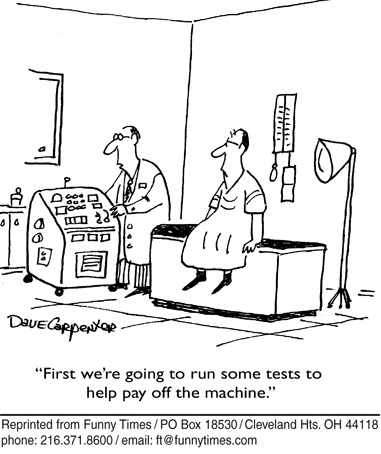How to Avoid Being Overtreated

In the field of medicine and health care, research continues to prove that when it comes to treatment – less is more. From a recent article in the NY Times:
More than 40 percent of 627 primary care doctors thought their own patients were overtreated; only 6 percent thought the patients received too little care, according to a survey published last week in Archives of Internal Medicine.
Why so many tests and referrals? Limited time to spend with patients, fear of being sued and financial incentives to do more were among the reasons cited by the physicians. Patients often worry about the cost of overtreatment but fail to recognize the potential harm of undergoing too many tests and procedures.
Almost all tests, imaging, drugs, surgery, and preventative interventions have some risk of adverse effects. In some cases, these harms have been proven to outweight the benefits (for example, treating asymptomatic women with postmenopausal hormone therapy). In other cases, services becomely widely used with inadequate proof of benefit.
Case in point; A recent recommendation from the U.S. Preventive Services Task Force that men at any age should no longer have annual PSA tests to detect prostate cancer. The panel says research shows that over all, the test does not save lives and leads to unnecessary surgery and radiation treatment for slow-growing cancers that would never have caused harm.
To put it simply, the costly medical testing and anxiety-producing follow up doesn’t work. This recent recommendation comes in the wake of similar recommendations regarding routine mammograms and other cancer tests for women.
Here’s how you can avoid overtreatment:
- Ask the Right Questions: When undergoing a test or procedure, patients often ask whether or not insurance will cover it. While a good question, patients should be more focused on the following: Why do I need this test? What do I get out of it? What’s my chance of something bad happening if I don’t get the test, or if I do get the test?
- Find out Alternatives: Balance the risks of any test or procedure against the potential benefit, given your medical history. Less-invasive, low-tech screenings with a lower risk of complications – a fecal occult blood test, for instance, instead of a colonoscopy – may be appropriate for some patients. Other tests, like CT Scans – can be swapped for a test with less risks (In general, a chest CT scan packs 100 times the radiation punch of a chest X-ray).
- Review Your Medications: If you take medications on a regular basis, have your doctor review your drug regimen periodically. Ask whether you may be able to wean yourself off a drug like a proton pump inhibitor if you make diet or lifestyle changes.
While preventative tests do have a place in health care, remember that real prevention keeps the immune system healthy. Eat right, exercise regularly, learn to cope with stress and get enough sleep. One more thing – see your chiropractor.











